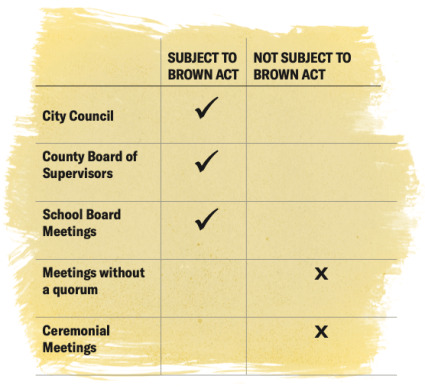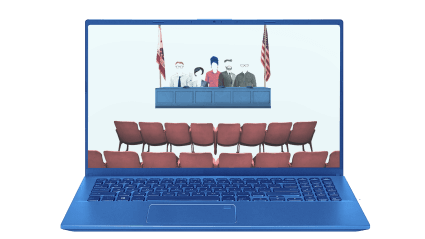Know Your Rights: The Brown Act and Open Meeting Rights
Esta página también se puede obtener en español.
California has a law that guarantees us all the right to participate in public meetings of most local governing bodies. Learn how to use the Brown Act to make your voice heard. If you need to report a violation, contact our legal intake line.
Overview of the Brown Act
WHAT IS THE BROWN ACT?
The Ralph M. Brown Act is California’s open meetings law. It mandates open and transparent government meetings for local legislative bodies.
The Brown Act applies only to local agencies such as city councils, school boards, and county boards of supervisors.
It requires local agencies to adhere to a set of rules so that government officials are not meeting in secret.
These rules mandate that members of the public have notice of government meetings and an opportunity to comment on what officials are doing in their name. The Brown Act creates transparency that strengthens democracy.
WHAT BODIES ARE SUBJECT TO THE BROWN ACT?
The Brown Act governs local bodies, including:
- City Councils
- County Board of Supervisors
- School Boards
- Special Districts such as water districts
- Other similar governing bodies such as commissions, committees, and even some agencies governing private corporations or hospitals.
The Brown Act applies to: “the governing body of a local agency or any other local body created by state or federal law; a commission, committee, board or other body of a local agency or that governs private corporations if a certain criteria is met; and the lessee of any hospital subject to specific provisions.”

WHEN IS A COMMITTEE A LEGISLATIVE BODY?
Whether a committee is a legislative body subject to the Brown Act depends on several factors. For example, an “advisory committee” composed solely of members of a legislative body that are less than a quorum of the legislative body is not subject to the Brown Act unless it is a committee created by formal action that covers a continuing subject matter or if its meeting schedule is fixed by a formal action of the legislative body.
An “ad hoc” committee composed only of less than a quorum of legislative members researching a particular issue for a limited time is likely not subject to the Brown Act.
If, however, a committee with less than a quorum of legislative members also includes members of the public or staff personnel, then that committee would be subject to the Brown Act.
Meeting Agendas
HOW CAN I ATTEND A PUBLIC MEETING OF A LEGISLATIVE BODY?
You can typically attend public meetings in person at the location listed on the meeting agenda. If the meeting location is at capacity, some legislative bodies provide overflow rooms. Some meetings also provide teleconferencing or videoconferencing options for the public, but such options are not always required.
HOW DO I KNOW WHAT THE BOARD OR COUNCIL WILL BE MEETING ABOUT?
Any meeting must include an agenda posted ahead of the meeting. The agenda must include a brief description of each item of business that will be discussed, providing enough information for the public to know what the legislative body will be considering during the meeting. Generally, the legislative body cannot take action on an item that is not included on the meeting agenda.
WHAT ARE THE AGENDA POSTING REQUIREMENTS UNDER THE BROWN ACT?
| FOR REGULAR MEETINGS | FOR SPECIAL MEETINGS | FOR EMERGENCY MEETINGS |
| Defined as a meeting set by the legislative body to conduct its business and meet as a full body, with a regular time and place. | Defined as a meeting that is set outside of the regular scheduled meetings to address specific, urgent, or time-sensitive matters. | Defined as occurring during drastic circumstances, such as work stoppage, crippling activity, or other activity that severely impairs public health, safety, or both, as determined by a majority of the members of the legislative body. |
| √ 72 Hours in advance √ Includes time and location √ Brief description of each discussion item, including items that will be discussed in closed session √ Available in alternative ADA formats √ Distribute in advance to those who request copies √ Posted in a physical location √ Posted on the agency’s primary internet homepage |
√ 24 Hours in advance √ Includes time and location √ Brief description of each discussion item, including items that will be discussed in closed session √ Available in alternative ADA formats √ Delivered to each member of the legislative body √ Delivered to each local newspaper, radio, or television stations requesting notice in writing |
√ Does not require advance notice |
'WHAT ARE ACTION ITEMS ON AN AGENDA?
Action items are those that are on the agenda and require the legislative body to deliberate and vote on the item. The legislative body cannot take action or discuss any item not on the agenda; however, members of the legislative body can briefly respond to statements or questions asked by the public. They can also make brief announcements. Only under very limited circumstances can a legislative body take action on items not on the agenda.
WHAT ARE CLOSED SESSION ITEMS?
In limited circumstances, the legislative body can hold a “closed” session during a regular or special meeting. This means that the body can meet behind closed doors. For example, a closed session is permitted to allow the legislative body to meet with its legal counsel about pending litigation and to consider personnel matters, including to hear complaints and charges brought against an employee. The agenda must include a brief description of the closed session item and the legislative body must report to the public if they took any action in closed session.
WHAT IS A CONSENT CALENDAR?
A consent calendar includes items deemed routine in nature. Items on a consent calendar will be considered as a block and voted upon in one vote unless a member of the legislative body “pulls” an item from the consent calendar for individual consideration later in the meeting. A member who votes in favor of the consent calendar is voting in favor of each item listed on the consent calendar.
Public Comment
CAN I PROVIDE COMMENTS DURING A LOCAL PUBLIC MEETING?
Yes. The public can provide verbal comments either during the general public comment period or on a specific agenda item. For the general public comment period, the public can give comments on any matter within the subject matter jurisdiction of the legislative body. For any agenda items, the public must be given an opportunity to comment before or during the body’s consideration of the item.
CAN THE LEGISLATIVE BODY LIMIT MY COMMENTS TO ONLY THOSE PERTAINING TO THE AGENDA ITEM?
Yes. Your comments can be limited to only the agenda item you’re commenting on. If you start providing comments on a different issue or a different agenda item, the body can ask you to hold your comments.
CAN THE LEGISLATIVE BODY LIMIT THE LENGTH OF MY PUBLIC COMMENTS?
Yes. The legislative body can adopt reasonable limits, including the total amount of time allocated for public comment or for each individual speaker (e.g., limiting each person to only 3 minutes for each agenda item).
CAN I USE AN INTERPRETER TO PROVIDE MY PUBLIC COMMENTS?
Yes. If the legislative body imposes time limits on public comment and you are using an interpreter to give your public comments, you must be provided with twice the allotted time to give your comments. If the legislative body uses translation equipment that allows for simultaneous translation, the legislative body is not required to provide you with twice the time.
CAN I PROVIDE WRITTEN COMMENTS?
Yes, you can submit written comments before a public meeting.
DO I HAVE TO PROVIDE MY NAME TO ATTEND THE MEETING?
No, you do not have to provide your name to attend the meeting. If an attendance list is posted near the entrance of the meeting or circulated during the meeting, it needs to state that signing is voluntary.
ARE SPEAKER CARDS PERMITTED?
Yes. You may be asked to sign up on a list or “speaker card” if you want to provide public comment. Some legislative bodies do this so they can track how many speakers want to provide public comment. But you cannot be prohibited from speaking if you refuse to sign up on a list or speaker card.
Decorum Rules
CAN I BE REMOVED FROM A PUBLIC MEETING FOR DISRUPTION?
Yes. You can be removed from a public meeting if are “disrupting” the proceedings or making true threats. Disrupting means engaging in behavior that actually disrupts, disturbs, impedes, or renders infeasible the orderly conduct of the meeting. Before you can be removed for disruption, you must receive a warning from the body that your behavior or actions are interrupting the meeting. You can be removed from the meeting if you do not stop your disruptive behavior.
A warning is not required if you engage in behavior that constitutes use of force or a true threat of force.
CAN I CRITICIZE THE LEGISLATIVE BODY?
Yes, you can criticize the legislative body. The legislative body cannot prohibit you from criticizing their policies, procedures, program, or services. They also can’t prohibit you from criticizing their actions, decisions, or failures to act.
Remote Meetings
ARE MEMBERS OF LEGISLATIVE BODIES ALLOWED TO PARTICIPATE REMOTELY IN A PUBLIC MEETING?
Yes, members of legislative bodies are allowed to participate remotely in public meetings if they have a “just cause” or an emergency. “Just cause” is limited to caregiving responsibilities, illness, physical or mental disability, or travel due to official business. An emergency is a physical or family medical emergency that prevents a member from attending in person. Members are also limited in how many times in a year they can participate remotely.
A majority of members, also known as quorum, is still required to meet in a physical, accessible location.
CAN I PARTICIPATE IN A PUBLIC MEETING REMOTELY VIA PHONE OR TELECONFERENCE?
It depends. If a member participates remotely under one of the “just causes” or emergency situations described above, then a remote option must also be made available to the public. Some bodies also provide a call-in or teleconference option for members of the public to participate, though it is not always required. Check the body’s website for details on how to observe and participate in a meeting.

